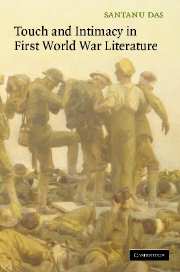2 - Geographies of sense
Published online by Cambridge University Press: 05 March 2014
Summary
In his war memoir, In Retreat (1925), Herbert Read recalls seeking refuge with his men at a dug-out under a ‘hellish bombardment’. The men squat on the floor around a few candles or cower on the ‘mist-wet’ earth as shell after shell continues to pound into the ‘invisible foreground’. This is a classic scenario in trench narratives, from Owen's letter describing being trapped in a dug-out under fire with ‘50 strong men trembling as with ague for 50 hours’ to Hervey Allen's Toward the Flame (1934): ‘we simply lay and trembled from sheer nervous tension’. In Read's narrative, an offensive is taking place overhead, the bombardment carries on and yet nothing can be known. The men, ‘dazed and quivering’, reach the end of their tether and the anxiety mounts. Read continues: ‘By ten o'clock or so, our hearts were like taut drum skins beaten reverberantly by every little incident. Then the skin smashed.’ What exactly does he mean? There is a curious conflation of surface and depth, of sound and touch: the phrase seems to suggest, beyond its metaphoric dimension, a pulsing consciousness that hovers between the perceptual and the psychic, a state of nervous intensification when the world is experienced through the flesh rather than a single cognitive faculty. In ‘The Raid’, trying to describe the experience of fear, he writes: ‘Their bodies broke in fear because the wild energy of the instinct was impingeing [sic] on a brittle red wall of physical being’.
- Type
- Chapter
- Information
- Touch and Intimacy in First World War Literature , pp. 73 - 106Publisher: Cambridge University PressPrint publication year: 2006



